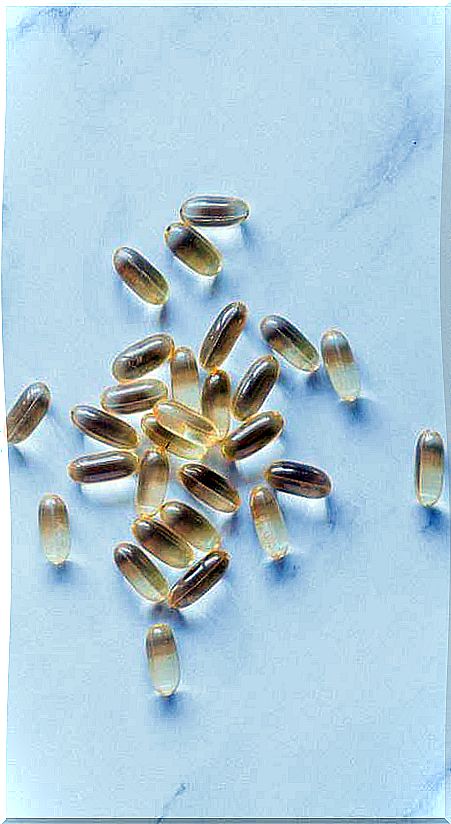8 Symptoms That Indicate An Omega-3 Deficiency
Omega-3 fatty acids are vital for your body. If you maintain a healthy and balanced diet you can meet your requirements. But what happens if you take too few? We explain what 8 symptoms can indicate an omega-3 deficiency.

Omega-3 fatty acids belong to the group of polyunsaturated fatty acids and play important roles in our metabolism.
These acids are alpha-linolenic (ALA), docosahexaenoic (DHA) and eicosapentaenoic (EPA). Alpha-linolenic is an essential nutrient and from it the body can synthesize the other two. DHA and EPA are also found in fish and some algae.
Among other things, fatty acids help regulate blood cholesterol levels, contribute to healthy brain and heart function, and normal eyesight.
What are the causes of an omega-3 deficiency?
To meet your recommended daily allowances for omega-3s, you should regularly incorporate healthy plant fats such as those found in flax oil or crushed seeds, chia seeds, or walnuts.
If these foods are not consumed, it is difficult for a vegetarian diet to provide all the necessary omega-3s. In the omnivorous diet, the guarantee is found in the fish.
On the other hand, too high an intake of omega-6 fatty acids can make the body unable to use ingested omega-3 fatty acids.
Since a lack of omega-3s can promote the development of cardiovascular disease, depression and rheumatism, you should take deficiency symptoms seriously.
8 symptoms of omega-3 deficiency
1. Difficulty concentrating
Do you have trouble concentrating at work and everyday life and make careless mistakes?
Concentration problems can be due to several factors. These include, for example, a sleep deficit or various nutritional deficiencies.
Among other things, an omega-3 deficiency may be the cause, as fatty acids are important for brain function.
2. Inner restlessness and depression
An omega-3 deficiency can not only manifest itself resulting in concentration problems. Due to its effect on brain function, a fatty acid deficiency can also make you feel restless or upset. If anxiety persists, you should see a doctor to get to the bottom of the cause.
Scientific research shows that countries with regular omega-3 consumption have lower rates of depression.
Omega-3 increases the release of the neurotransmitter serotonin, which improves mood. Therefore, regular consumption of omega-3s can normalize the neuronal activity of the brain.
In addition, studies show that omega-3s can help reduce the inflammatory state of the brain. This makes omega-3 fatty acids an important component for healthy brain function.
3. Fatigue
Are you constantly tired even if you have no trouble falling asleep or staying asleep? Persistent fatigue can have several causes.
In addition to the most common cause, which is often trouble sleeping, triggers include a lack of fluid or exercise, an unhealthy diet, or a deficiency of nutrients, especially iron and omega-3 fatty acids.
https://www.cuerpomente.com/alimentacion/alimentos-vegetales-ricos-omega-3_6795
4. Bad eyesight
When it comes to eye problems, very few people think of a nutritional deficiency. But insufficient intake of omega-3 fatty acids can affect it.
For example, dry or inflamed eyes and visual disturbances may occur. See a doctor if you have eye problems.
5. Muscle weakness
In the case of an omega-3 deficiency, muscle weakness may appear, also known medically as muscle hypotonia or myasthenia.
Besides a lack of exercise, a lack of nutrients is one of the most common causes of muscle weakness. If you suffer from decreased muscle strength or muscle tension, be sure to discuss the problem with a doctor.
6. Dry skin
Fatty acids are important for the proper functioning of the cells in your body. That also includes your skin cells. Omega-3 is an important component of the lipid (fat) content of the skin.
Omega-3 supports the skin’s barrier function, which acts as a protective covering, allowing moisture to penetrate but keeping irritants away.
Since omega-3s keep skin cells moist and strong, dry skin and premature wrinkles are among the first signs of deficiency symptoms.
7. Joint pain, arthritis
Omega-3 fatty acids are powerful anti-inflammatories. Research suggests that regular consumption of these essential fatty acids may reduce joint tenderness, decrease stiffness, and reduce the use of medications for arthritis symptoms.
8. Weight gain
Omega-3 fatty acids are found in most metabolically active cells in the body. Omega-3s have been shown to increase this metabolic activity of cells. Therefore, a lack of omega-3s can slow down your metabolism and possibly lead to weight gain.
A study published in the American Journal of Clinical Nutrition showed that both omega-3 intake and regular exercise help improve cardiovascular health.









